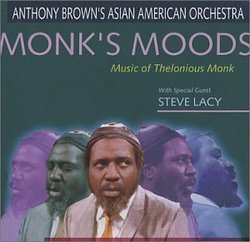If you don't buy this record . . .
Jan P. Dennis | Monument, CO USA | 01/15/2004
(5 out of 5 stars)
". . . I'll buy it for you--that's how taken I am by it. Of course, I couldn't afford to purchase thousands or hundreds or even scores of copies of this disc for all of you that will be wanting one after you've been pummeled into submission by this overheated, superlative-laden review. But you get the idea.The opening ehru (two-stringed Chinese viola) passage of "Monk's Mood," the first cut on this gloriously quirky reading of Thelonius Sphere Monk's equally gloriously quirky songs, joined a few measures later by pipa (Chinese dulcimer), mesmerically sets the tone for this astounding record. Is there a more poignant sound in music than the sound of the ehru? Not that I know of. And, eeriely, its odd timbre EXACTLY fits the somber/plaful sensibility of "Monk's Mood." When the full orchestra comes in at the three minute mark, with its faux-lazy playing, sounding like some sort of ur-Ellington band, you know you've been vaulted out of this world into jazz heaven. Melecio Magdaluyo's quietly brilliant alto sax solo, played over striking pipa comping and Mark Izu's slyly swinging acoustic bass, continues what may be one of the most glorious covers in the history of jazz."Jackie-ing" continues the vibe with a stark pipa opening topped off by some inspired drum bashes courtesy of Anthony Brown. After a short orchestral passage, Steve Lacy makes his first appearance on soprano saxophone. Besides spinning out a tart, succinct, perfectly porportioned solo, Lacy displays his unique ss tone, which is like no one else's in the history of jazz and which has become THE defining approach to the instrument, proving that he is to the soprano sax what Pharoah Sanders is to the tenor sax--the absolute master of tone and timbre.More mystery's in store on "Brilliant Corners," ominously opening with baritone sax and Chinese mouth organ, giving way at the 45 second mark to solo pipa, with the whole orchestra coming in at about 1:30. This piece continues some stunning arranging, with, esp., the lower register instruments (bari sax, 'bone, tuba, bass clarinet, and acoustic bass) providing a massive bottom that gives huge tonal gravitas to this music. Another cool move is the way individual instruments or small groupings move in and out of the larger full-group soundscape.Lacy cranks out another stunning solo on "Misterioso," this time blooze-drenched and angularly swinging, which precisely matches the mood of this amazing tune, taken at a very leisurely pace which brings out its drunkenly soporific vibe. Brown gets into the conversation with some wacky percussive moves deftly punctuating the woozy, lurching orchestral voice."Hackensack" features Lacy in a most expressive and declamatory mood. A man who has spent a lifetime studying and recording Monk's music, Lacy gives definitive evidence as to why there will never be a better interpreter of Monk. Indeed, he seems to have somehow inhereted Monk's spirit, almost as Elisha in the Old Testament inherited a double portion of Elijah's spirit, with his jaunty voicings and madcap lyricism. With it's stop-on-a-dime rhythmic and mood shifts, this show-stopping number ratchets the proceedings up to another, impossibly high, level.The mood changes yet again on "Crepuscle with Nellie," this time to one of somber jollity, the three-minute pipa opening passage setting the table for Wayne Wallace's inebriated wah-wah trombone solo then re-entering ever so briefly with a pianolike coda."Little Rootie Tootie" comes charging out of the gate, appropriately, in full orchestral roar, morphs to a wacky pipa passage, then settles into a jauntily top-hat-and-cane sophistication, moves into a tersely effective series of solos on trombone and tenor sax all the while supported by killer walking bass, slips into some muscular dual sax work, and finishes off with a controled freak-out by the entire orchestra. Simply stunning."Friday the 13th," a monk tune new to me, begins, appositely enough, with horror-movie soundrack voicings by the full orchestra, giving way at about the one-minute mark to another revelatory Lacy solo, underpinned initially by chugging bass clarinet and then solely by string bass and percussion. Once again Lacy's tone, simultaneously rich and piercing (really, how does he do it?!) astounds. A succinct bass solo follows, then another rich orchestral passage, and finally the briefest reprise by Lacy closes things out."Pannonica," perhaps Monk's best-known tune, a remarkable pipa-soprano sax duo for the first three-and-a-half minutes, each instrument hinting, teasing at the melody, with Lacy playing the richest-sounding soprano sax on record, closes out the disc in stunning fashion, with the faintest hint of bass and percussion joining in to give the tune a beauty and power found only in recordings of the greatest merit.Words simply cannot begin to describe the weird beauty that shines through this music with a brilliant crepuscular light. The only other record I'm aware of that approaches its stupifying genius is Malicool, that wild meeting of avant-garde trombone and traditional Malian sensibilities. All in all, perhaps the most consistently dazzling disc I have ever heard."


 Track Listings (8) - Disc #1
Track Listings (8) - Disc #1